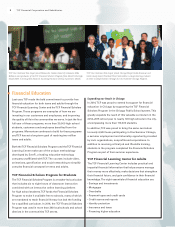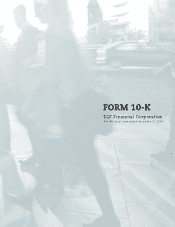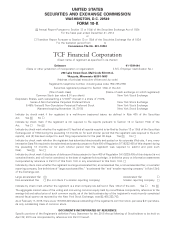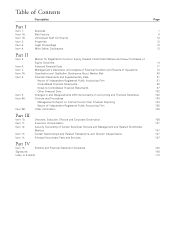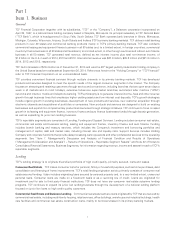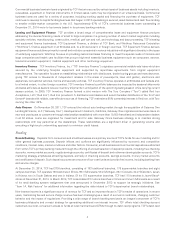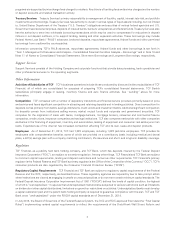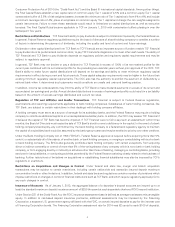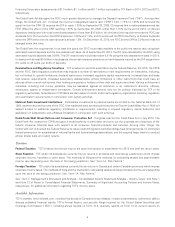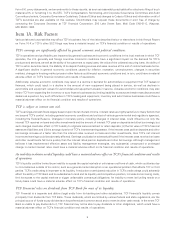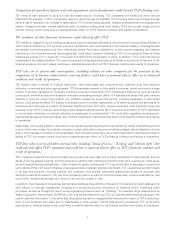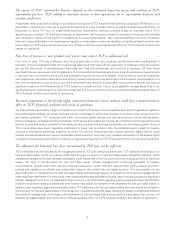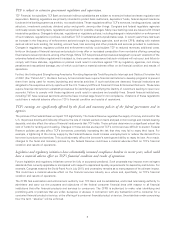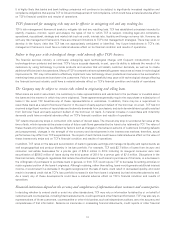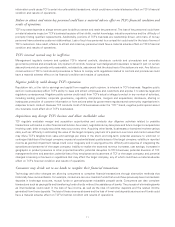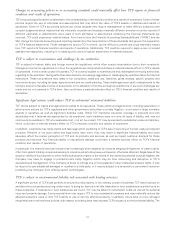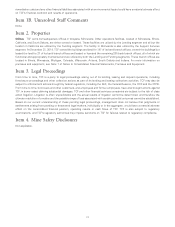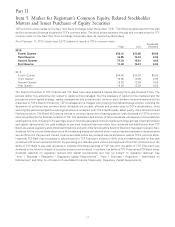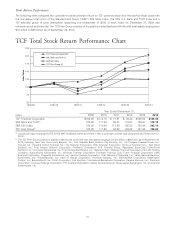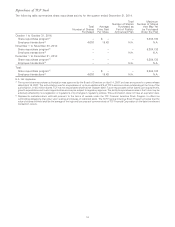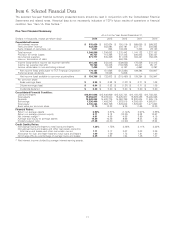TCF Bank 2014 Annual Report Download - page 20
Download and view the complete annual report
Please find page 20 of the 2014 TCF Bank annual report below. You can navigate through the pages in the report by either clicking on the pages listed below, or by using the keyword search tool below to find specific information within the annual report.Competition for growth in deposits and evolving payment system developments could increase TCF’s funding costs.
TCF relies on bank deposits to be a low cost and stable source of funding. TCF competes with banks and other financial
institutions for deposits. If TCF’s competitors raise the rates they pay on deposits, TCF’s funding costs may increase through
either a loss of deposits or an increase in rates paid by TCF to avoid losing deposits. Industry developments involving payment
system changes could also impose additional costs. Increased funding costs could reduce TCF’s net interest margin and net
interest income, which could have a material adverse effect on TCF’s financial condition and results of operations.
The soundness of other financial institutions could adversely affect TCF.
TCF’s ability to engage in routine funding transactions could be adversely affected by the actions and commercial soundness of
other financial institutions. TCF routinely executes transactions with counterparties in the financial industry, including brokers
and dealers, commercial banks and other institutional clients. As a result, defaults by, or even rumors regarding, any financial
institutions, or the financial services industry generally, could lead to losses or defaults by TCF or a counterparty. Many of these
transactions expose TCF to credit risk in the event of default of the counterparty or client. In addition, TCF’s credit risk may be
exacerbated if the collateral held by TCF cannot be realized or is liquidated at prices not sufficient to recover the full amount of the
financial exposure. Any such losses could have a material adverse effect on TCF’s financial condition and results of operations.
TCF relies on its systems and counterparties, including reliance on other companies for the provision of key
components of its business infrastructure, and any failures could have a material adverse effect on its financial
condition and results of operations.
TCF settles funds on behalf of financial institutions, other businesses and consumers and receives funds from payment
networks, consumers and other paying agents. TCF’s businesses depend on their ability to process, record and monitor a large
number of complex transactions. Third party vendors provide key components of TCF’s business infrastructure, such as internet
connections, network access and transaction and other processing services. While TCF has selected these third party vendors
carefully, it does not control their actions. Any problems caused by these third parties, including inadequate or interrupted
service, could adversely affect TCF’s ability to process, record or monitor transactions, or to deliver products and services to its
customers and otherwise to conduct its business. Replacing these third party vendors could also entail significant delay and
expense. If any of TCF’s financial, accounting or other data processing systems fail or if personal information of TCF’s customers
or clients were mishandled or misused (whether by employees or counterparties), TCF could suffer regulatory consequences,
reputational damage and financial losses, any of which could have a material adverse effect on its financial condition and results
of operations.
Additionally, TCF may be subject to disruptions of its operating systems arising from events that are wholly or partially beyond its
control, which may include, for example, computer viruses, electrical or telecommunications outages, natural disasters, terrorist
acts or other damage to property or physical assets. Such disruptions may give rise to loss of services to customers and loss or
liability to TCF. Any system failure could have a material adverse effect on TCF’s financial condition and results of operations.
TCF faces cyber-security and other external risks, including ‘‘denial of service,’’ ‘‘hacking’’ and ‘‘identity theft,’’ that
could adversely affect TCF’s reputation and could have a material adverse effect on TCF’s financial condition and
results of operations.
TCF’s computer systems and network infrastructure present security risks, and could be susceptible to cyber-attacks, such as
denial of service attacks, hacking, terrorist activities or identity theft. Hacking and identity theft risks, in particular, could cause
serious financial and reputational harm. Cyber threats are rapidly evolving and TCF may not be able to anticipate or prevent all
such attacks. While TCF does not believe it has experienced a material cyber-security breach, TCF experiences periodic threats
to its data and systems, including malware and computer virus attacks, attempted unauthorized access of accounts, and
attempts to disrupt its systems. TCF may incur increasing costs in an effort to minimize these risks, could be held liable for, and
could suffer reputational damage as a result of, any security breach or loss.
In addition, there have been increasingly sophisticated and large-scale efforts on the part of third parties to breach data security
with respect to financial transactions, including by intercepting account information at locations where customers make
purchases, as well as through the use of social engineering schemes such as ‘‘phishing.’’ For example, large retailers such as
Target Corporation, Home Depot, SUPERVALU Inc. and Neiman Marcus Group LTD LLC reported data breaches resulting in the
loss of customer information. In the event that third parties are able to misappropriate financial information of TCF’s customers,
even if such breaches take place due to weaknesses in other parties’ internal data security procedures, TCF could suffer
reputational or financial losses which could have a material adverse effect on its financial condition and results of operations.
7


